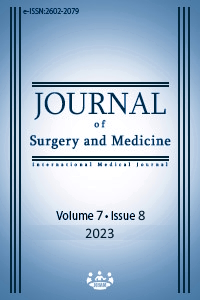Effect of macrocytosis on erlotinib response in metastatic non-small cell lung cancer
Macrocytosis with erlotinib in non-small cell lung cancer
Keywords:
erlotinib, macrocytosis, nonsmall cell lung cancerAbstract
Background/Aim: Numerous studies have assessed the relationship between macrocytosis and responses to chemotherapeutic agents and TKIs such as sunitinib and imatinib. However, there is limited data in the literature regarding the prognostic or predictive value of macrocytosis in using erlotinib. If a relationship is detected, early response/resistance assessment can be performed before imaging time in the follow-up of treatments, and a more cost-effective, non-invasive method can be employed for response monitoring. This study aimed to elucidate the effect of macrocytosis on response rates in patients treated with erlotinib for non-small cell lung cancer.
Methods: Seventy-five individuals diagnosed with non-small cell lung cancer (NSCLC) and admitted to our institution were enrolled in this retrospective cohort study. Baseline demographics, time of diagnosis, previous treatment, and the initiation or cessation of erlotinib were recorded. Data of patients with and without macrocytosis were analyzed. Stable disease, partial and complete response rates, and progressive disease response were evaluated separately as response rates. Progression-free survival between drug initiation and discontinuation due to progression was interpreted using Kaplan-Meier curves.
Results: The distribution of the overall survival (OS) and progression-free survival (PFS) evaluations revealed that 84% (n=63) of the patients were deceased, and the progression rate was 94.7% (n=71). The median OS of the patients was 18 months, and the median PFS was 11 months. There was a statistically significant difference in overall survival in females, with a median OS of 25 months (95% CI 17–32 months) and a median OS of 13 months in males (95% CI 9–20 months) (P=0.008). PFS was 14.5 months (95% CI 11–21 months) in women and six months (95% CI 4–17 months) in men, and there was a statistically significant difference (P=0.02). A statistically significant difference was achieved between MCV values measured during diagnosis and the third month between age groups (P=0.044).
Conclusion: The outcomes of this research suggest a statistically significant difference between the MCV values measured at the time of diagnosis and the third month regarding age groups. Both OS and PFS in women were statistically significantly higher than in men.
Downloads
References
Buszka K, Ntzifa A, Owecka B, Kamińska P, Kolecka-Bednarczyk A, Zabel M, et al. Liquid Biopsy Analysis as a Tool for TKI-Based Treatment in Non-Small Cell Lung Cancer. Cells, 2022;11(18):2871.
Tommasi C, Scartabellati G, Giannarelli D, Giorgi U, Brighi N, Fornarini G, et al. The role of mean corpuscular volume and red cell distribution width in patients with metastatic renal cell carcinoma treated with tyrosine kinase inhibitors: the MARECAP retrospective study. Ther Adv Urol. 2023;15:17562872231187216.
Roskoski R Jr. Properties of FDA-approved small molecule protein kinase inhibitors: A 2023 update. Pharmacol Res. 2023;187:106552.
Shen F, Li F, Ma Y, Song X, Guo W. Identification of novel stemness-based subtypes and construction of a prognostic risk model for patients with lung squamous cell carcinoma. Curr Stem Cell Res Ther. 2023;10.2174/1574888X18666230714142835.
Liu SY, Zhang JT, Zeng KH, Wu YL. Perioperative targeted therapy for oncogene-driven NSCLC. Lung Cancer. 2022;172:160-9.
Burger JA. Bruton Tyrosine Kinase Inhibitors: Present and Future. Cancer J. 2019;25(6):386-93.
Murugesan S, Murugesan J, Palaniappan S, Palaniappan S, Murugan T, Siddiqui SS, et al. Tyrosine Kinase Inhibitors [TKIs) in Lung Cancer Treatment: A Comprehensive Analysis. Curr Cancer Drug Targets. 2021;21(1):55-69.
Dellapasqua S, Bagnardi V, Bertolini F, Sandri MT, Pastrello D, Cancello G, et al. Increased mean corpuscular volume of red blood cells predicts response to metronomic capecitabine and cyclophosphamide in combination with bevacizumab. Breast. 2012;21(3):309-13.
Shinde A, Panchal K, Katke S, Paliwal R, Chaurasiya A. Tyrosine kinase inhibitors as next generation oncological therapeutics: Current strategies, limitations and future perspectives. Therapie. 2022;77(4):425-43.
Thomson RJ, Moshirfar M, Ronquillo Y. Tyrosine Kinase Inhibitors. In: StatPearls. Treasure Island (FL): StatPearls Publishing; July 18, 2023.
Grothey A, Van Cutsem E, Sobrero A, Siena S, Falcone A, Ychou M, et al. Correct study group. regorafenib mono-therapy for previously treated metastatic colorectal cancer (CORRECT): An international, multicentre, randomise placebo-controlled, phase 3 trial. Lancet 2013;381(9863):303-12.
Reed JP, Chung J, Banerjee N. A Case of Cobalamin Deficiency and Macrocytic Anemia Secondary to Sunitinib. Cureus. 2019;11(3):e4310.
Rini BI, Choueiri TK, Elson P, Khasawneh MK, Cotta C, Unnithan J, et al. Sunitinib-induced macrocytosis in patients with metastatic renal cell carcinoma. Cancer. 2008;15;113(6):1309-14.
Aliberti S, Grignani G, Allione P, Vormola R, Bucci AS, Porrino G, et al. Erythrocyte macrocytosis is a rather common apparently uneventful yet unexplained finding in GIST imatinib (I) chronic therapy. Proc ASCO. 2005;827S:9045.
Lee JY, Choi H, Park JW, Son BR, Park HJ, Jang LC, et al. Age‐related changes in mean corpuscular volumes in patients without anaemia: An analysis of large‐volume data from a single institute. J Cell Mol Med. 2022;26(12):3548-56.
Schallier D, Trullemans F, Fontaine C, Decoster L, De Greve J. Tyrosine kinase inhibitor-induced macrocytosis. Anticancer Res. 2009;29(12):5225-8.
Mendel DB, Laird AD, Xin X, Louie SG, Christensen JG, Li G, et al. In vivo antitumor activity of SU11248, a novel tyrosine kinase inhibitor targeting vascular endothelial growth factor and platelet-derived growth factor receptors: determination of a pharmacokinetic/pharmacodynamic relationship. Clin Cancer Res. 2003;9(1):327-37.
Reck M, van Zandwijk N, Gridelli C, Baliko Z, Rischin D, Allan S, et al. Erlotinib in advanced non-small cell lung cancer: efficacy and safety findings of the global phase IV Tarceva Lung Cancer Survival Treatment study. J Thorac Oncol. 2010;5(10):1616-22.
Downloads
- 438 619
Published
Issue
Section
How to Cite
License
Copyright (c) 2023 Seher Nazlı Kazaz , Mustafa Emre Duygulu
This work is licensed under a Creative Commons Attribution-NonCommercial-NoDerivatives 4.0 International License.
















